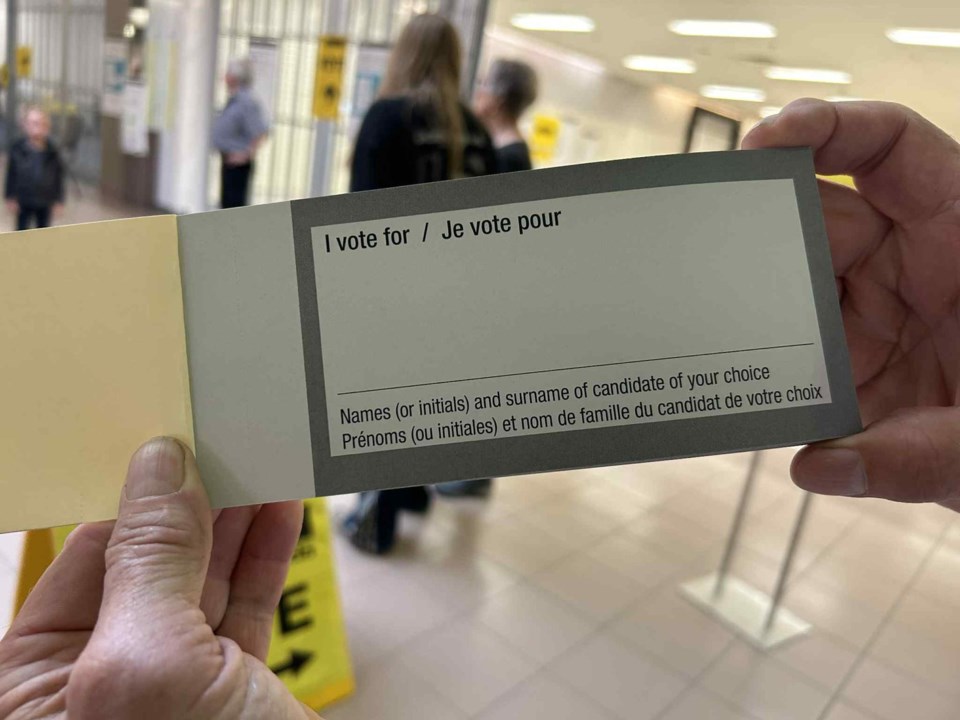CAMROSE — Bob Pushie pulled a small piece of paper from his shirt pocket, where he had written a candidate's name the day before, and double-checked the spelling on his ballot.
"I had a little cheat sheet," Pushie said Friday, after he cast his advanced vote for the Aug. 18 federal byelection in Battle River-Crowfoot.
A coil-bound, 32-page laminated booklet listing the record 214 candidates in the riding was available for Pushie to flip through at the polling station in Camrose, Alta.
He didn't need the help, he said, but the unique voting process got him and his wife thinking about Canada's electoral system.
"It has to somehow be more difficult to run."
In this byelection, there is no marking an x. Voters must hand write the name of their preferred candidate in a blank space.
For the first time in Canadian history, Elections Canada says its using the blank ballot because there are so many candidates.
The majority are part of the Longest Ballot Committee, a protest group calling for various changes to the election system.
The byelection also features Conservative Leader Pierre Poilievre, Liberal candidate Darcy Spady, the NDP's Katherine Swampy and Independent Bonnie Critchley.
Prime Minister Mark Carney called the byelection in June after Conservative Damien Kurek, who handily won the seat in the April general election, stepped down so Poilievre could run. Poilievre lost his long-held Ottawa seat of Carleton in the April vote.
Adapted ballots with two columns have been used in previous elections with a higher-than-usual number of candidates, said Elections Canada.
But this time, the list is too long.
Jordan Leah Anderson said she went through the thick booklet of candidates' names to make sure she had the right spelling on her ballot.
"You can see everybody that you have an option to vote for. It wasn't a huge pain in the butt," said the farmer.
"The pages don't stick."
She said it was important to get out and vote for the candidate she thinks will help further shape the economy in the rural riding, which stretches down the eastern side of the province from Edmonton to Calgary.
Anderson's mother also voted with her.
"'I knew the spelling of the person that I was voting for but it was nice to have a double-check, make sure everything was correct," said Karen Anderson. "It's so easy."
Candidates are listed in alphabetical order by surname in the booklet. Magnifiers are available and poll workers have been given extra training so they can help.
If a voter misspells a candidate's name, it will still be counted, said Elections Canada spokesperson Matthew McKenna.
"They can also include the name of the political party. However, if they write only the name of a political party, their ballot cannot be counted. The candidate's name has to be there."
Poilievre has voiced his frustrations with the longest ballot initiative.
There were more than 90 candidates running in Carleton in the federal election, making that ballot bulky and requiring a number of folds in order to submit it.
"I don't have a problem with anyone who wants to run for office, even if they're not known or not wealthy," Poilievre said during an unrelated news conference in Calgary.
"But that's not what these people are doing ... they just want to inundate the ballot to confuse the situation, make it harder for people to vote. People with vision problems, the elderly, others who have difficulty now will have a harder time voting."
Retired Camrose resident Jim Fitzgerald said it felt odd to write a candidate's name on the ballot Friday, after having marked boxes on ballots for years.
"It's not right. There should not be that many names," he said,
He didn't want to reveal who he voted for but said the candidate's name "is everywhere."
Fitzgerald admitted he's not the best speller, so he also looked through the booklet to make sure he got the candidate's name right.
"All the names are pretty big (in the booklet)," he said.
Advance voting ends Monday night.
This report by The Canadian Press was first published Aug. 8, 2025.
Fakiha Baig, The Canadian Press



